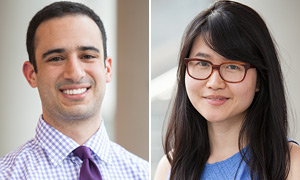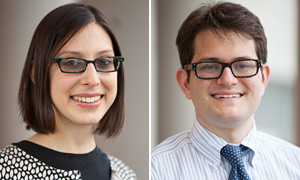

Moving From Student to Practitioner
Four Einstein Students Eye the Future with Confidence
At Einstein's Match Day event in March, four students in the crowd of anxious fourth-years were seemingly less stressed than many of their peers. That's because Jennifer Lee, Rebecca Weiss, Jose Diaz and Russ Levine—who each will specialize in ophthalmology—already knew a portion of their residency match results.
The Early Match Experience
Ophthalmology is a highly competitive, "early match" specialty. Like a few other fields such as dermatology and anesthesiology, it has a preliminary-year requirement that must be completed before the focus shifts to their specialty. 
Jose Diaz (left), Jennifer LeeCandidates apply through the San Francisco Matching Program in mid-August, a month earlier than those vying for spots in the general March residency match. Early-match applicants actually apply for two separate matches—once for the three-year specialty residency and then for the preliminary year. They first learn their match status for their specialty training in mid-January.
For the Einstein foursome, the news on where they will train in ophthalmology came on January 13. Ms. Lee, who learned she would head to the University of Pittsburgh, remembers the day vividly:
"We were informed we'd be getting an e-mail at 7 a.m. I was up at 6:45, hitting the refresh button on my gmail, nervously awaiting the verdict…Matched.
"Then I received a phone call from my residency program director welcoming me to the program. I was at an interview for a prelim position at the time; I had no one to celebrate with, so I turned to the nearest stranger and asked for a hug. I got it! What a great day."

Rebecca Weiss (left), Russell LevineShe and her fellow future "ophtho" experts got their preliminary year match results (St. Luke's/Roosevelt for Ms. Lee) along with their 2015 classmates at the traditional Match Day festivities, in March.
Double Vision
Since it occurs several months before the more common Electronic Residency Application Service system, with fewer applicants, "the ophthalmology match process is a much quieter affair," Mr. Diaz explained in a recent blog post on Einstein's The Doctor's Tablet.
It can also be a challenge. "The dual application meant twice the workload, time and effort," said Ms. Weiss. "I had to obtain extra letters of recommendation, compose two different personal statements and enter the same information about my education and experience twice, but it was worth it!"
She's looking forward to preliminary training at Maimonides Medical Center and residency at Montefiore Medical Center, Einstein's University Hospital and academic center.
Finding Their Focus
Ms. Weiss's interest in the eye peaked toward the end of first year. "I was amazed by the histology, anatomy and physiology," she said.
"The clerkship was pivotal in leading me to ophthalmology," said Mr. Diaz. "I'd always known I wanted to do surgery but found I also enjoyed clinical problem solving and guiding patients." He's headed to Harvard for a preliminary year at Massachusetts General Hospital and residency at Massachusetts Eye and Ear Infirmary.
Ms. Lee decided on ophthalmology toward the end of third year. "My surgery and medicine clerkships made me realize I wanted a balance of surgical and medical in my career," she said. "I began exploring specialties that had both and found ophthalmology.
"I enjoyed hearing patients' stories about recovering their vision," she continued. "Working with attendings, residents and classmates who were genuinely happy to be part of this specialty reinforced that it was the ‘right fit' for me."
Ophthalmology's Appeal
"Ophthalmology is the coolest field in the world," said Russ Levine, who matched at Memorial Sloan Kettering Cancer Center for his preliminary year and at Yale for his residency. "The eye is a beautiful, intricate, important organ. Its anatomy and pathology are very interesting. Diagnosis, surgery and follow up—we get to do it all. And we can diagnose other illnesses such as hypertension, autoimmune diseases, diabetes and advanced HIV."
"Vision is a vital part of life that we often take for granted--until we lose it," said Ms. Weiss.
"The eye is the only part of the body through which you can see nerves, blood vessels and pathology with the naked eye," she noted. "Often, you can make the diagnosis just by looking at a patient, come up with a treatment plan on the spot and provide the potential for quick relief or recovery. It's very gratifying."
A Great Educational Foundation
Ms. Lee praised her mentors at Montefiore. "They taught me how to use the slit lamp, indirect ophthalmoscope and so much more," she said. "They continue to inspire me."
"The support and guidance provided by Montefiore's ophthalmology faculty and residents were essential to my success," agreed Mr. Levine. "From the summer of my first year, Dr. Jamie Rosenberg was an outstanding mentor to me. Dr. Roy Chuck [department chair] also gave me opportunities to explore exciting clinical and research work. And the willingness of residents to teach and work with us med students helped us to discover what a career in ophthalmology could be."
"Einstein laid a very solid foundation for me. I am extremely happy with my matches," added Mr. Diaz.
Ms. Weiss concurred. "The people at Einstein and Monte ophtho were there for me when I needed them: from application advice and scheduling assistance to soothing my interview anxiety. I couldn't have gotten to where I am, happy and successfully matched, without them."
Posted on: Tuesday, May 26, 2015

Tablet Blog